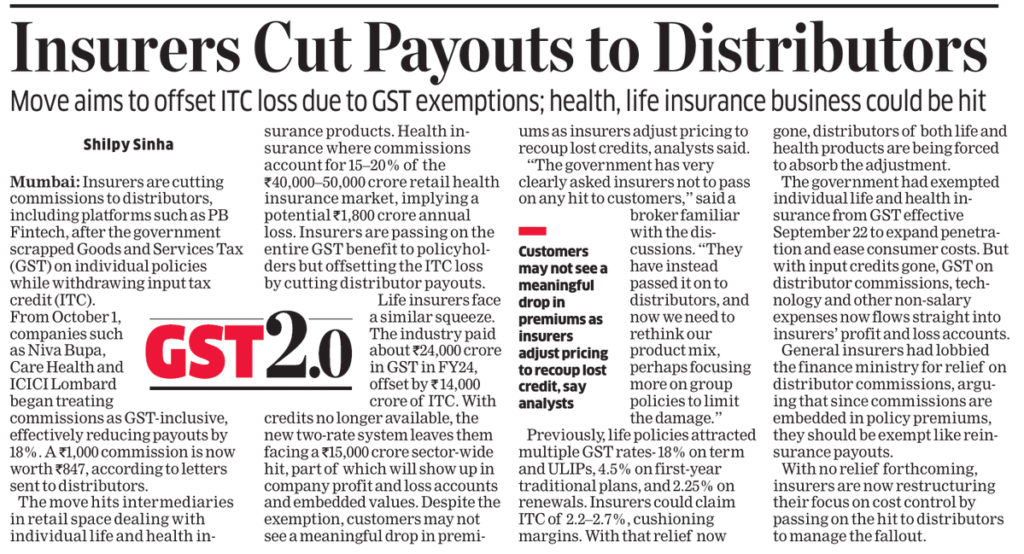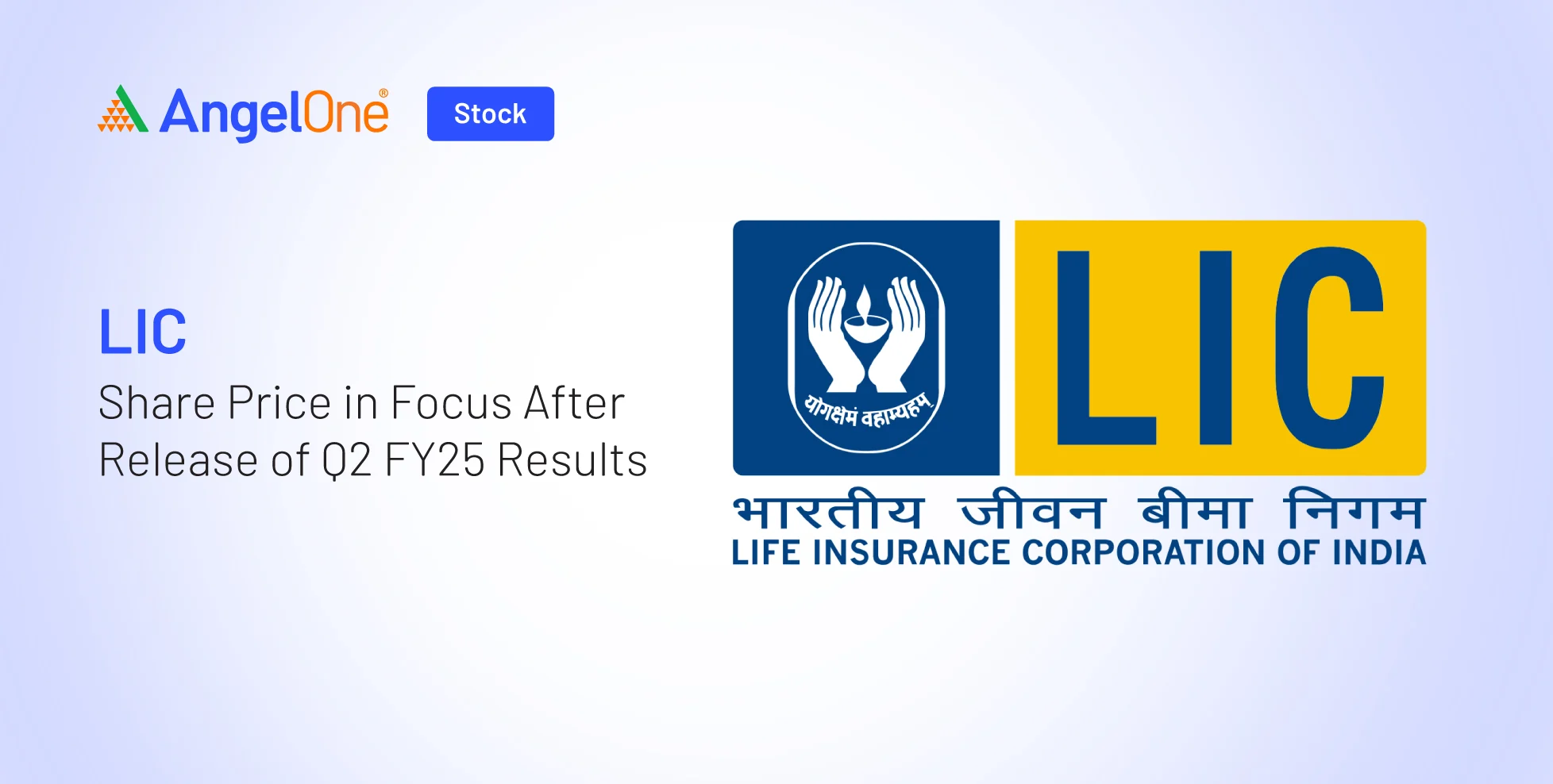GST Exemption Hurting Insurance Brokers: The removal of GST (Goods and Services Tax) on insurance premiums from September 22, 2025, was initially welcomed by millions of policyholders across India. The move was seen as a step toward making insurance products—both life and general—more affordable for consumers. However, while insurance buyers are celebrating lower premiums, a different story is unfolding for insurance agents, brokers, and distributors who form the backbone of the industry’s sales network.
With the removal of GST, insurance companies can no longer claim input tax credit (ITC) on their operational and administrative expenses, including commissions paid to intermediaries. This change has resulted in a 2–3% increase in operating costs for insurers. To absorb this additional financial burden, private insurance companies have reduced agent commissions by 15–18%, effective October 1, 2025.
While public sector insurers and the Life Insurance Corporation of India (LIC) continue to maintain their existing commission structure, private insurers are passing on the impact of ITC loss to their agents. The situation highlights a classic policy dilemma — a reform aimed at consumer relief has shifted financial pressure onto the intermediary ecosystem that drives insurance penetration in the country.
Understanding the GST Exemption on Insurance
The GST exemption on insurance means that insurance premiums are no longer subject to the 18% Goods and Services Tax. This directly reduces the amount paid by policyholders on their life, health, motor, or other insurance policies. The move was widely appreciated by consumer groups and policymakers as a measure to boost insurance adoption in a price-sensitive market like India.
However, there’s a hidden downside. When GST was in effect, insurance companies were eligible to claim input tax credit on various business expenses — from administrative costs and marketing expenditures to commissions paid to agents. This helped insurers offset their tax liabilities and manage operating margins effectively.
Now, with GST removed, insurers cannot claim ITC on these expenses, which increases their cost of doing business. As a result, most private insurers have chosen to cut commission payouts to intermediaries to maintain profitability.
Read about: Hidden in Fine Print: The Clause That Lets Insurers Quietly Increase Your Health Insurance Premium
How the Input Tax Credit (ITC) Loss Impacts Insurance Companies
1. Higher Operating Costs
The loss of ITC means insurers can no longer recover taxes paid on services and goods used in their operations. This increases overall operating costs by 2–3% of premium collections.
2. Reduced Margins for Private Insurers
To preserve financial margins, insurers have started reducing commissions for agents and distributors. The reduction ranges between 15% and 18%, significantly affecting the income of insurance intermediaries who rely heavily on commissions.
3. No Change for LIC and PSU General Insurers
Interestingly, the Life Insurance Corporation (LIC) and Public Sector Undertaking (PSU) general insurers are maintaining their existing commission structures. LIC, which was already absorbing GST costs before the exemption, continues to bear the burden to shield its agents. PSU general insurers have also chosen to absorb the ITC loss, ensuring agents’ earnings remain unaffected.
Industry Reactions: Mixed Feelings Over the Policy
The decision has sparked mixed reactions within the insurance ecosystem.
Policyholders have welcomed the move, as they directly benefit from lower premiums. However, insurance intermediaries and agents are feeling the heat of reduced income, with many fearing that the policy could affect agent motivation and insurance penetration in rural and semi-urban markets.
Prashant Mhatre, President of the General Insurance Agents Federation Integrated (GIAFI), expressed concern over the unintended consequences of the policy:
“While the GST exemption aims to make insurance more affordable for consumers, it has unintentionally put the burden on intermediaries and agents who are critical to the industry’s growth.”
Industry insiders also warn that cutting agent commissions may affect new policy sales, renewal follow-ups, and customer service quality, particularly in non-metro regions where agents play a vital role in building trust and awareness.
How Commission Cuts Could Impact the Insurance Ecosystem
1. Shrinking Agent Earnings
Insurance agents typically earn a percentage of the premium as commission. A 15–18% cut significantly reduces their earnings, especially for those who rely on commission income for their livelihood.
2. Lower Agent Retention and Motivation
Reduced income could demotivate existing agents and deter new entrants from joining the profession, potentially leading to a decline in the active sales force in the private insurance sector.
3. Slower Growth in Insurance Penetration
India’s insurance penetration remains relatively low compared to developed markets. Any move that impacts agents’ incentives could slow down the pace of insurance adoption, especially in Tier-2 and Tier-3 cities.
4. Competitive Disparity Between Public and Private Insurers
While LIC and PSU insurers continue to maintain commission levels, private players reducing payouts could face a competitive disadvantage in retaining experienced intermediaries.

Policy Implications and the Road Ahead
The government’s intent behind removing GST was noble — to make insurance products more affordable and accessible. However, experts suggest that the policy could have been implemented alongside compensatory measures for insurers to retain the input tax benefit.
Industry bodies are expected to engage with the finance ministry and the Insurance Regulatory and Development Authority of India (IRDAI) to find solutions that balance consumer benefits with the sustainability of the agent network.
Possible measures could include:
- Allowing limited ITC claims for specific categories of expenses.
- Offering tax rebates or incentives to insurers maintaining existing commission levels.
- Introducing a transitional compensation mechanism to prevent commission volatility.
Conclusion
The GST exemption on insurance has delivered relief to policyholders but introduced a new challenge for insurers and intermediaries. While consumers are paying less for their policies, the financial strain on private insurance companies due to the loss of input tax credit is prompting commission cuts for agents.
This adjustment, though economically logical from a company standpoint, risks disrupting the very ecosystem that drives insurance penetration in India. The burden of lost ITC is effectively being transferred to the distribution network, impacting thousands of insurance agents and brokers nationwide.
LIC and PSU insurers have shown resilience by absorbing the cost rather than passing it down, reflecting their long-term approach to maintaining agent relationships and ensuring stability in the market.
To safeguard the industry’s growth trajectory, policymakers and regulators may need to revisit the post-GST exemption framework, ensuring that reforms designed to help consumers do not inadvertently weaken the foundation of insurance distribution in India.
Also read: Honda CB1000F 2026 Review: A Retro Masterpiece with Fireblade DNA
FAQs on GST Exemption and Its Impact on Insurance Brokers
1. Why did the government remove GST on insurance premiums?
The GST exemption was introduced to make insurance products more affordable for consumers and to increase insurance penetration across India. Removing the 18% GST directly lowers premium costs for policyholders, especially in the life, health, and motor insurance segments.
2. How does the GST exemption affect insurance companies?
With the removal of GST, insurers can no longer claim input tax credit (ITC) on operational costs like commissions, administrative expenses, and marketing. This increases their business costs by about 2–3% of premium collections, impacting profitability.
3. Why are private insurers cutting agent commissions?
To offset the loss of ITC and protect margins, private insurance companies have reduced agent commissions by 15–18% from October 1, 2025. This helps them manage the additional operational expenses resulting from the GST exemption.
4. Are LIC and PSU insurers affected by the commission cuts?
No. LIC and PSU general insurers have not reduced commissions. LIC had already been absorbing GST costs before the exemption, while PSU insurers have decided to absorb the ITC loss without affecting agent income.
5. How will this change impact insurance agents and policy sales?
Reduced commissions will directly affect the income of insurance agents, potentially lowering morale and retention rates. This could lead to a slower pace of insurance adoption, especially in smaller towns and rural areas where agent-driven sales are dominant.







1 thought on “GST Exemption Hurting Insurance Brokers: Private Insurers Cut Commissions to Offset Input Tax Credit Loss”